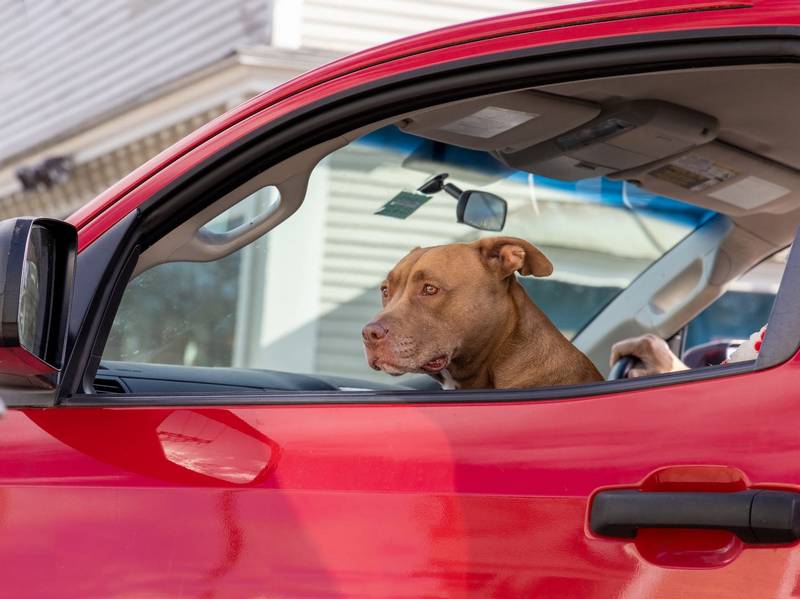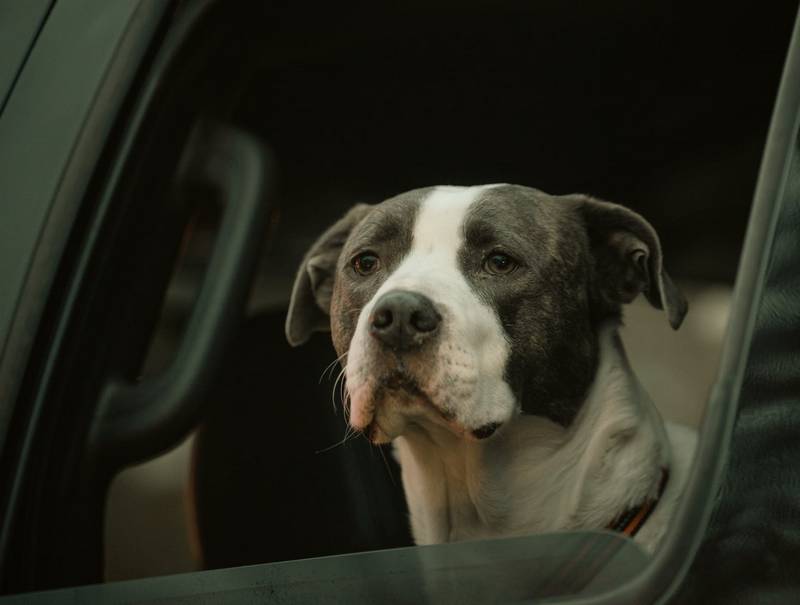How to Stop Dog Barking in Car [Easy Command]
Struggling with a dog that won’t stop barking in the car? This article will be your guide to understanding and resolving this frustrating problem. We’ll cover all you need to know about why dogs bark in the car, regardless of whether they’re barking at other dogs, drivers, or even the sound of car doors slamming.
We’ll fill you in on tips and techniques to keep your dog calm during car rides, like how to use the “Quiet” command effectively to stop the barking, and we’ll also discuss other strategies like crating your dog for safety and comfort. Understanding the root of your dog’s car anxiety or excitement is key, and we’re here to help you navigate through it. Keep reading!
Dog Barking in Car

Dogs bark in the car mainly due to excitement, anxiety, territoriality, or reactions to external stimuli like other animals or people. Each dog’s reason for barking may vary, but these are the most common underlying causes for this behavior.
Why Do Dogs Bark in the Car?
Dogs bark in the car primarily due to excitement, anxiety, territoriality, or because they’re reacting to pets or people in another car. For some dogs, the car is a source of joy and adventure, and their barking is a way of expressing this excitement. Others may feel anxious or nervous due to the movement, confinement, or past negative experiences associated with car rides.
Dog Barking at Other Dogs in Car
If your dog barks at other dogs in the car, it could be a display of territorial behavior or reactive barking. The confined space of the car might make your dog feel more compelled to defend their territory. Additionally, seeing other dogs while unable to interact with them might trigger frustration or excitement, leading to barking.
How to Stop Dog Barking in the Car
- Identify Triggers: Determine what outside the car triggers your dog’s barking, such as other dogs, people, or moving objects.
- Desensitize and Counter-Condition: Gradually expose your dog to these triggers in a controlled way while offering treats and praise for calm behavior.
- Train the ‘Quiet’ Command: When your dog barks, calmly say “Quiet” and wait for them to stop barking. Once they stop barking, even for a brief moment, immediately reward them with a treat and praise. If they resume barking, repeat the command. Be patient and consistent. Practice this regularly in various situations to reinforce the training.
- Provide Distractions: Use toys or treats to redirect your dog’s attention away from the window or the triggers outside.
Your dog barking in the car is a common issue that can stem from various triggers. These steps will help stop the problem, but it’s important to remember that the underlying behavioral issues (overexcitement, anxiety, territoriality, overprotectiveness, etc.) that were causing all of this to begin with will still be present.
And until you address those, any positive changes you see will only be temporary.
“Well, how do I make these changes last?”
By getting your dog to truly choose to follow your direction, that’s how. I tried many times to write out how you can do that before deciding it made more sense to just link you to the free video series that explains it better than I’d ever be able to.
The series is by a man named Dan who is one of the world’s leading dog obedience trainers. In it, he teaches you how to put an end to things like your dog barking in the car and all other misbehavior using his fast and easy-to-follow methods.
In the first video, Dan will reveal to you why the two most common methods of dog training only doom you to failure. You can watch the video now by clicking here. Follow the proven system he’ll show you in his series and you’ll never have to spend another second worrying about why your dog barks in the car ever again!
Why Does My Dog Bark in the Car?

Your dog barks in the car for a variety of reasons, such as excitement, anxiety, territorial instincts, or as a reaction to external stimuli like other drivers, animals, or the changing scenery outside. Understanding this behavior requires an awareness of your dog’s emotional responses and triggers during car rides.
Dog Barks at Other Drivers
Your dog barking at other drivers often stems from their instinctual reaction to moving objects and unfamiliar people in close proximity to their territory—the car. This behavior can be a manifestation of the dog’s protective nature or a sign of overstimulation caused by the constant movement and activity on the roads.
Learn to steps to stop your dog barking at other drivers, including an easy-to-learn command, by going back to the first section now.
How to Keep Dog Calm in Car
Ensuring your dog’s calmness in the car involves creating a comfortable and familiar environment. This can include playing calming music or using items like their favorite blanket or toy.
Positive reinforcement through treats and praise when they display calm behavior is important. Gradual exposure to car rides and ensuring they have a positive association with the car through short, enjoyable trips can also significantly reduce anxiety and stress.
Should I Crate My Dog in the Car?
Using a crate for your dog in the car can be a very helpful safety measure. If your dog views the crate as a safe, comfortable space, it can help reduce anxiety and limit distractions while you’re driving.
It’s important to ensure the crate is well-ventilated, secure, and the right size for your dog to stand, turn around, and lie down comfortably. Acclimating your dog to the crate in a non-moving vehicle initially can help make the transition smoother.
In conclusion, understanding the reasons behind your dog’s barking in the car and addressing these behaviors through training, creating a comfortable environment, and considering safety measures like crating, can greatly improve the car riding experience. Patience and consistency are key to helping your dog become more relaxed and less vocal during car rides.
Dog Barks at Car Doors Closing

Dogs bark at car doors closing due to the loud, sudden noise which can startle them or trigger their alertness. This reaction is part of their natural instinct to respond to unexpected sounds in their environment, often perceived as potential threats or disturbances.
Why Do Dogs Bark at Slamming Car Doors?
Dogs bark at slamming car doors primarily because the sudden loud noise can be startling or intimidating. This reaction is part of their instinctual alert system to potential threats. For some dogs, the sound might be perceived as an intrusion into their territory, prompting a protective or alert response.
Additionally, the unfamiliarity of the sound of car doors slamming can confuse dogs, causing them to bark as a way to communicate their discomfort or to warn their family of what they perceive as danger. The “quiet” command is perfect for these situations; learn it now in the first section.
Do Car Doors Closing Scare Dogs?
The sound of car doors closing can scare dogs, especially if they are not accustomed to it. Dogs have sensitive hearing, and the abrupt loud noise of a door slamming can be startling and cause anxiety. Some dogs may react more intensely due to previous negative experiences, lack of exposure to varied sounds, or general nervousness.
In some cases, dogs might associate the sound of car doors with unwelcome changes or departures, such as you leaving the apartment, further contributing to their anxiety.
How to Stop Dog Barking at Car Doors Closing
To stop a dog from barking at car doors closing, gradual desensitization and positive reinforcement are effective strategies. Start by exposing your dog to softer door-closing sounds (we have a video below you can use) and rewarding them for calm behavior.
Gradually increase the volume over time. Consistently rewarding your dog for remaining calm in the presence of the noise helps them associate the sound with positive outcomes, reducing fear and barking behavior.
In conclusion, dogs bark at car doors closing or slamming as a natural response to a sudden, loud noise. Understanding this and helping your dog become accustomed to the sound through patient training and positive reinforcement can significantly reduce their stress and barking.
I’m sure you’re ready to get going now that you have all of your questions about your dog barking in the car answered, so I’ll let you get started on things. Best wishes, and thank you for checking out our article “How to Stop Dog Barking in Car [Easy Command]”.





